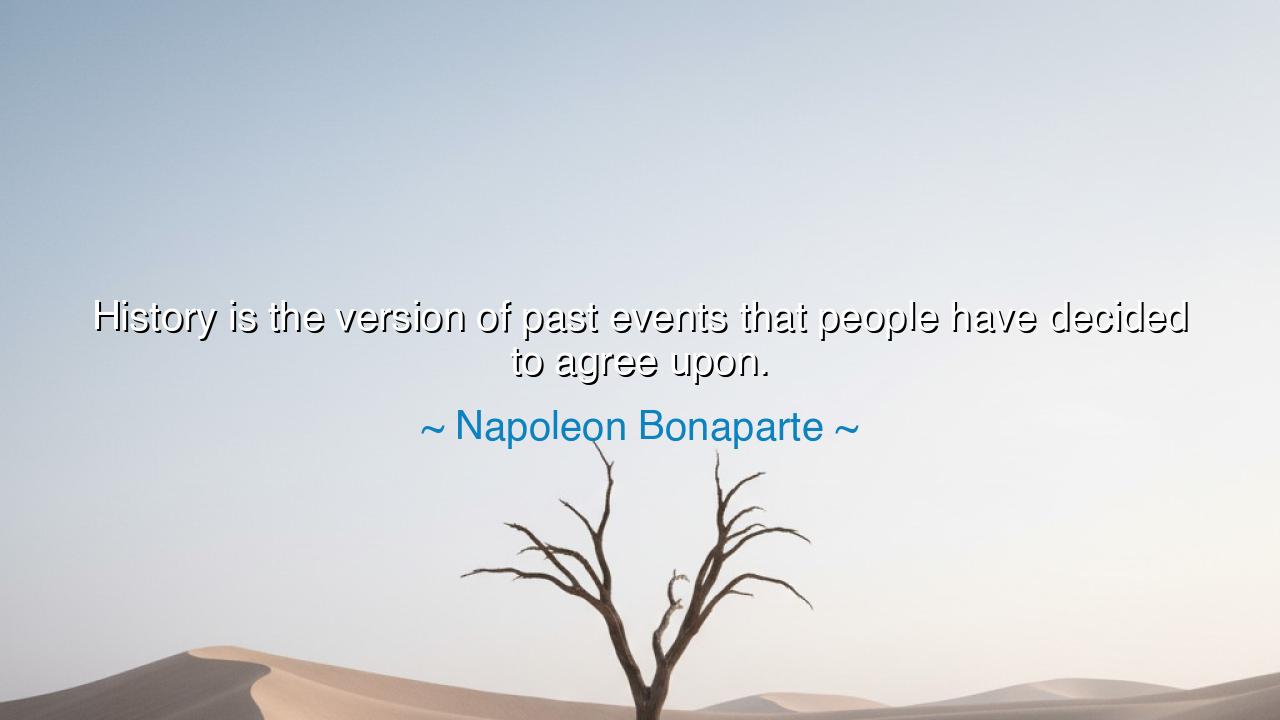
History is the version of past events that people have decided to






“History is the version of past events that people have decided to agree upon.” Thus spoke Napoleon Bonaparte, the emperor, conqueror, and philosopher of power — a man who himself became both the maker and the myth of history. In these words, spoken with a conqueror’s clarity and cynicism, Napoleon revealed one of the most unsettling truths about the human story: that history is not pure truth, but collective memory, and collective memory is always shaped by those who survive, who write, and who rule. It is not always the past itself that endures, but the tale that the victors and their followers choose to tell about it.
The origin of this quote lies in Napoleon’s own awareness of how his deeds — glorious or infamous — would one day be remembered. He, who had risen from a soldier of Corsica to the Emperor of France, understood that history is never written by witnesses alone, but by interpreters — men of pens and printing presses, politicians and priests, who polish and rearrange the truth to fit the needs of the present. In exile on the island of Saint Helena, stripped of his empire yet still master of his intellect, Napoleon saw his own story already being rewritten — by enemies who called him tyrant and by admirers who called him genius. Thus, he declared that history is an agreement, not a mirror. It is the compromise between truth and power, between memory and myth.
Consider how this truth has echoed through the ages. When the Roman Empire fell, who wrote its story? Not the conquered, but the conquerors — not the slaves who built its temples, but the emperors who sat upon its thrones. The Romans told the world they brought civilization to barbarians, yet the tribes they subdued remembered a different tale: of fire, blood, and lost freedom. When Christopher Columbus crossed the ocean, history called it “discovery,” though others called it invasion. When empires fell, their ruins whispered truths that the chronicles forgot. Thus, Napoleon’s insight holds firm: history is not the past, but the story the victors tell of it — and every story is shaped by agreement, by consensus among the powerful about what shall be remembered and what shall be buried.
Yet Napoleon’s words do not condemn history to falsehood; rather, they call us to discernment. For even if history is shaped by agreement, it is still our duty to question the terms of that agreement. The past may be written by the victors, but it is read by the free. The wise do not take history as given; they sift it as the miner sifts the riverbed, seeking the small, shining truth beneath the silt of opinion. Each generation must reexamine the past, challenging the narratives handed down to them, lest the truth be lost beneath layers of flattery and deceit. History must be studied not to believe, but to understand.
And yet, there is a certain poetry — and tragedy — in the idea that memory is a creation of consensus. It means that what we remember as a people, as a civilization, is an act of unity. The stories we tell about our ancestors are not just records; they are the roots of identity. To agree upon history, even imperfectly, is to hold together the fragile thread of belonging. For though history may be malleable, it also binds us: it is the shared mirror through which we recognize ourselves as part of a greater human story. Thus, Napoleon’s words, though cynical in tone, also reveal a strange hope — that the human desire for meaning, even at the cost of truth, is itself a form of continuity.
But beware the danger that comes when agreement replaces inquiry, when comfort silences conscience. When history becomes the servant of power, it ceases to teach and begins to deceive. The greatest tyrannies of the modern age — those of the 20th century — understood this all too well. Dictators burned books, erased records, and replaced truth with propaganda, crafting a version of the past that glorified their rule and justified their crimes. In such times, to remember differently became an act of rebellion. Thus, the fight for freedom has always been, in part, the fight for memory — to remember what truly was, not merely what is permitted to be remembered.
So, my children, take this teaching to heart: do not be content with the history you are given. Seek the truth behind it. Read the voices of the defeated, the forgotten, the silenced. For only when all stories are heard can the truth of the past approach wholeness. Do not fear disagreement — for it is through disagreement that truth is refined. Let the agreement of history never become the tomb of inquiry.
And thus, the wisdom of Napoleon endures: history is not a relic; it is a negotiation between memory and meaning. It can deceive, but it can also enlighten, if we dare to question it. Be seekers, not merely inheritors, of the past. For those who accept history without question walk in shadows, but those who wrestle with it walk in the light.






AAdministratorAdministrator
Welcome, honored guests. Please leave a comment, we will respond soon